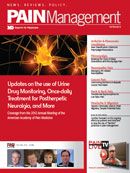The Vicious Cycle of Sleep Disturbance and Fibromyalgia Pain
Insomnia, disordered sleep, and other sleep disturbances are frequently seen in patients with fibromyalgia, and are often associated with increased daytime fatigue and pain.
Dmitry M. Arbuck, MD
President, Meridian Health Group, and Assistant Professor of Psychiatry and Medicine, Indiana University School of Medicine
“Sleep disturbance is so common in patients with fibromyalgia that some sleep doctors believe that fibromyalgia is essentially a sleep disorder that comes with body pain. Almost all medications that improve sleep help with a broad range of fibromyalgia symptoms, as well. The key is to use medications that combine several actions: anticonvulsants with sedating properties (gabapentin and pregabalin); sedating mood stabilizers (quetiapine, olanzapine, and asenapine); anti-cataplexy in narcolepcy (sodium oxybate); antidepressants (paroxetine and mirtazapine); antihypertensive (clonidine), muscle relaxants (tizanidine and cyclobenzaprine) or wakepromoting medications (modafinil and armodafinil). The choice of medication is based on corresponding symptoms, such as neuropathy, depression and anxiety, mood instability, muscle spasms, or daytime sedation, to name a few. All of these medications stabilize the central nervous system in one way or another; all of them work in the brain and usually have to be combined for best results. Benzodiazepines frequently disinhibit pain perception and, though they may be good for sleep, are not good for fibromyalgia, especially in a long run.”
According to the National Fibromyalgia Research Association (www.nfra.net), up to 75% of patients with fibromyalgia (FM) report experiencing some form of sleep disturbance. Multiple studies have shown that lack of sleep and/or disordered sleep can lead to increased daytime fatigue and greater pain sensitivity and intensity in patients with fibromyalgia. This can in turn lead to further disruptions in patients’ sleep, creating a negative feedback cycle of worsening symptoms and decreased quality of life.
The authors of an article published in 2007 in Sleep Medicine Clinics wrote that “Clinical survey studies suggest that the majority of FM patients present with insomnia complaints, including difficulty initiating sleep, sleep maintenance problems, or persistent nonrestorative sleep. Studies of clinical FM patients have shown that a worsening of sleep enhances subsequent daytime distress and pain complaints, whereas exacerbations of daytime pain or psychosocial distress often are followed by increased nocturnal sleep disruption.” They concluded that, “given such findings, it seems reasonable to speculate that sleep disturbance is mechanistically important to the etiology or symptom maintenance of the FM syndrome” (http://bit.ly/zyhcWp).
The link between sleep disturbance and fibromyalgia appears to be so strong that some researchers have been investigating whether the sleep problems are a result of painful fibromyalgia symptoms or are a major contributing factor to the development of the illness itself. The authors of “Sleep Problems and Risk of Fibromyalgia” (http://bit.ly/yAtQQ0) analyzed data on more than 12,000 women who did not have fibromyalgia, musculoskeletal pain, or physical impairments at baseline, and found that “sleep problems are closely associated with risk of FM development.” They reported that “the risk increases in a dose-dependent manner according to the frequency of the sleep problems.”
Pregabalin Shows Promise in Helping to Improve Sleep in Patients with Fibromyalgia
In addition to reducing pain in some patients, treatment with pregabalin may also be associated with improvements in some measures of sleep. In one study, patients treated with pregabalin experienced “statistically-significant and meaningful improvements in sleep” over the course of four weeks, compared to patients who received placebo (http://bit.ly/y7TKrb). In another study, in which patients received placebo or pregabalin twice daily for 14 weeks, the authors reported that “all pregabalin doses demonstrated superiority to placebo on the Medical Outcomes Study-Sleep Scale Sleep Disturbance subscale and the Sleep Quality diary” (http://bit.ly/AiIplk).
The authors of “Sleep Disturbance in Fibromyalgia Syndrome (FMS): Relationship to Pain and Depression (http://bit.ly/ wxMaTl) reported similar findings, noting poor sleep may be a chronic problem in this population, an observation that is “further supported by literature indicating that, despite receiving 6—8 hours of sleep, patients with FMS wake up stiff, fatigued, and in pain,” suggesting that “improving sleep quality in this population would decrease pain, possibly also impacting functioning and depression, and that the focus should be on quality of sleep, not quantity.”
